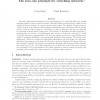Free Online Productivity Tools
i2Speak
i2Symbol
i2OCR
iTex2Img
iWeb2Print
iWeb2Shot
i2Type
iPdf2Split
iPdf2Merge
i2Bopomofo
i2Arabic
i2Style
i2Image
i2PDF
iLatex2Rtf
Sci2ools
STOC
2004
ACM
2004
ACM
The zero-one principle for switching networks
Recently, approximation analysis has been extensively used to study algorithms for routing weighted packets in various network settings. Although different techniques were applied in the analysis of diverse models, one common property was evident: The analysis of input sequences composed solely of two different values is always substantially easier, and many results are known only for restricted value sequences. Motivated by this, we introduce our zero-one principle for switching networks which characterizes a wide family of algorithms for which achieving capproximation (as well as c-competitiveness) with respect to sequences composed of 0's and 1's implies achieving c-approximation. The zero-one principle proves to be very efficient in the design of switching algorithms, and substantially facilitates their analysis. We present three applications. First, we consider the Multi-Queue Switching model and design a 3-competitive algorithm, improving the result from [12]. Second, ...
Related Content
| Added | 03 Dec 2009 |
| Updated | 03 Dec 2009 |
| Type | Conference |
| Year | 2004 |
| Where | STOC |
| Authors | Yossi Azar, Yossi Richter |
Comments (0)

